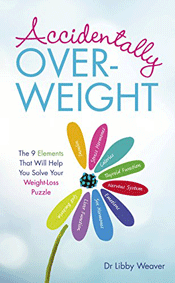When nutritional biochemist Dr Libby Weaver – the health expert that actor Hugh Jackman called “a one-stop shop in achieving and maintaining ultimate health and wellbeing” – was studying dietetics and biochemistry at Sydney University in the late 1990s, the prevailing wisdom on weight gain and loss was calories in/calories out.
Then she started practising in the real world and found clients who were running marathons or calorie-counting obsessively would be gaining rather than losing weight.
Thirteen years and hundreds of clients later, Libby (pictured below) is convinced there are lesser-known but powerful reasons people can’t lose weight.
“Calorie-controlled diets weren’t working for [my clients],” says Libby. “That led me to go back to my biochemistry textbooks with the question in mind: what leads the human body to get the message to either burn fat or store fat”.
The author of Accidentally Overweight: The 9 elements that will help solve your weight loss puzzle (published by Hay House) and other nutrition books, and who has a following online and on TV, Libby says factors such as stress level and how our bodies process insulin are all too often overlooked by dieters (and those advising them).
STRESS
The link between stress and obesity is being increasingly confirmed in scientific research. For Libby, it’s one of the prime reasons people can’t lose weight.
A one-time marathon runner, Libby remembers her body under so much stress that she gained 6kg. What was going on?
“When we’re under stress we’re constantly churning out the stress hormone adrenalin and that prepares our body to fight an attack or flee from it,” she says.
“Blood supply is diverted away from processes such as digestion to the muscles so we can run or fight and causes the body to use glucose, not body fat as its fuel. It’s why stressed people crave sweets as their bodies need it for fuel.”
When stress is prolonged, the body starts to make another stress hormone, cortisol, which breaks muscles down – and having less muscle subsequently slows down metabolism.
Studies have found that people with high cortisol levels tend to put weight on around their middle.
Tip: ‘When you spot a spare few minutes in a day, stop and breathe properly.’ Diaphragmatic breathing is best to lower stress levels, where you breathe in slowly ensuring your belly – not your chest – expands on the in breath. Try doing 20 of these once a day, Weaver suggests.
SEX HORMONES
For women in the week leading up to their period, weight gain can be no illusion. Libby sees clients put on up to 3kg pre-menstrually, which can be down to retaining fluid caused by rising oestrogen levels. Levels of progesterone drop at this time, which makes matters worse.
‘This hormone [progesterone] is an anti-anxiety agent and diuretic that allows us to get rid of excess fluid,” she says.
‘This state of low progesterone can impact the type of food a woman chooses and lead to sugar cravings in an effort to calm herself down, it will also impact her motivation to exercise.”
Tip: If you tend to get fluid retention symptoms such as bloating around the stomach, swollen breasts or weight gain, try cutting out coffee and replacing it with herbal tea for four weeks (or one cycle at least) to see if symptoms subside. It’s believed that substances called methylxanthines in caffeine-based products (even when decaffeinated) can contribute to symptoms.


HIGH INSULIN
Insulin is the hormone made in the pancreas that helps the body move sugars from food into the cells of our bodies. It transports glucose first to the liver and then to the muscles where it’s stored as glycogen to use as energy.
“If there’s any left over, which there usually is, it’ll take it to the body fat cells and store it there,” says Libby.
Carbohydrate foods all break down into glucose in the blood and refined carbohydrate foods and sugars can lead to excess insulin as they cause sharp spikes in blood sugar and signal the body to make more to process it. But that’s not the whole picture.
“Adrenalin spikes blood sugar too’,” says. “If you haven’t eaten for a while and you are sitting at your desk and receive 16 emails about an unexpected crisis at work or home, your adrenalin production increases because your body now thinks that there’s danger and that spikes your blood sugar.”
Sitting at your desk you’re not going to use the extra glucose available to you because you haven’t got a physical threat to fight or flee from, she explains.
“So once again, more insulin has to be made to get the excess glucose out of the blood, leading to more fat storage, Libby says.
If you have spent months committing to exercise and eating well with no results, have your blood glucose levels and your blood insulin levels tested with your GP, she suggests.
Tip: Get your carbohydrates from whole foods, especially vegetables and fruit and make sure your meals contain protein such as lean meat, fish, eggs or pulses with some fat such as avocado, nuts, seeds, olive oils and olives as this combination can slow the release of glucose into the blood, requiring less insulin.
NERVOUS SYSTEM
Our brains are wired for survival in primitive times and this can disrupt how our bodies burn fat.
Libby explains that the autonomic nervous system is the part of the brain that “runs” the body behind the scenes and is not under our conscious control.
“It regulates our heart rate, respiration rate, temperature control, and immune and hormonal systems while we get on with our lives,” she says.
“It has two parts: the sympathetic nervous system (SNS) our ‘fight or flight’ system, and the parasympathetic nervous system (PNS) our ‘rest and repair’ system. Both these systems should work in balance – but for most of us they don’t.
“Most people exist in a state of SNS dominance, which means we’re constantly in the fight or flight response. This causes adrenalin overload leading the body to only use glucose as fuel and not body fat.”
The PNS on the other hand helps restore calm, balance and functions such as digestion and skin that suffer during stressful periods and it’s stimulated by rest and relaxation (it’s why you look and feel better after a holiday).
Tip: Try a weekly restorative practice of some kind, Libby advises. “One of the best ways to activate your PNS is by lengthening your exhalation, and Tai Chi, yoga and Pilates all help you do that,” she says.
EMOTIONS
‘The question I love to ask my clients is ‘Why do you do what you do when you know what you know?’’ says Libby.
“It’s not a lack of education that leads someone to polish off a packet of chocolate biscuits after dinner. It’s a subconscious feeling of ‘I am not enough’ and I see it time and again’. So what’s going on?
“At work, my clients will all day be living between polarities of acceptance versus rejection, successes versus failure based on all the little interactions of their day.
“Then, whether it’s been lousy meetings, something they interpreted as a dirty look from a co-worker or a heated exchange – or all of the above – they show up at home at night with all that piled onto their inner world, so their emotions are in chaos and they want a way to feel whole again.
“If food is their thing – as it is for so many people – they’ll end up with the contents of the pantry in their tummies.”
Tip: Next time you’re tempted to eat to numb negative emotions, don’t judge yourself but be curious as to why it happened, suggests Libby. Try mindfulness practices to help you feel the feelings and acknowledge that the feelings themselves can’t hurt you and will eventually go away – but binging can by thwarting your weight loss efforts.




